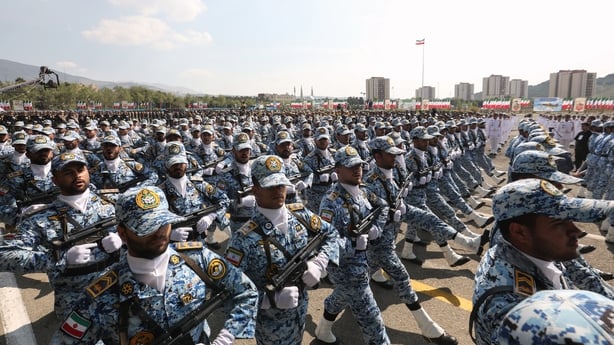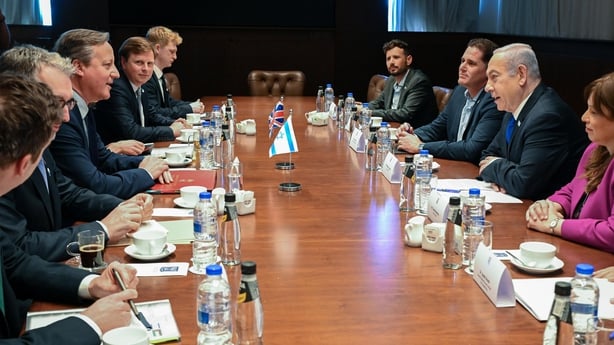Israel's commitments to improve aid access in Gaza have had "limited and sometimes nil" impact, United Nations Secretary-General Antonio Guterres has said as he pushed for urgent, meaningful and measurable progress to avert famine.
The United Nations has long complained of obstacles to getting aid in and distributing it throughout Gaza during the six-month-old war between Israel and the Palestinian militant group Hamas, which rules the enclave of 2.3 million people.
"To avert imminent famine, and further preventable deaths from disease, we need a quantum leap in humanitarian aid to Palestinians in Gaza. Food is essential; so are clean water, sanitation, and healthcare," Mr Guterres told the Security Council.
Israel recently reopened the Erez crossing into northern Gaza and allowed the temporary use of Ashdod port in southern Israel after US President Joe Biden demanded steps to alleviate the humanitarian crisis in Gaza, saying conditions could be placed on US support for Israel if it did not act.
"Apparent progress in one area is often cancelled out by delays and restrictions elsewhere," said Mr Guterres.
"For example, although the Israeli authorities have cleared more aid convoys, those clearances are often granted when it is too late in the day to make deliveries and return safely," he said. "So the impact is limited, and sometimes nil."
'Pure utopia'
The US State Department has said there had been "some measurable progress" on getting aid into Gaza.
"But the circumstances within Gaza continue to be dire and more absolutely needs to be done. The crisis that we're seeing demands rapid expansion of these efforts," State Department deputy spokesperson Vedant Patel told reporters.
Mr Guterres said three World Food Programme convoys - a total of 25 trucks - were authorised to use the Erez crossing on 14-16 April1.
He also said that operating hours of Kerem Shalom and Nitzana crossings had been expanded by Israel, but security concerns meant the hours could not be expanded in Gaza.
The UN and aid groups need to use all possible routes and crossings into and throughout every part of Gaza, and also require Israel's full and active facilitation of aid operations "and improved and direct communications between humanitarians and military decision makers on the ground," Mr Guterres said.
Israel is retaliating against Hamas in Gaza over an 7 October attack on southern Israel led by the militant group.
Israel says about 1,200 people were killed and more than 250 people were taken hostage in the assault, and Gaza health authorities say Israel has killed nearly 34,000 people in its offensive in Gaza since then.
Israel's UN Ambassador Gilad Erdan did not directly address the humanitarian situation in Gaza when he spoke to the Security Council, but he called out the 15-member body for its focus on the conflict.
"The amount of time, effort, and resources poured into Gaza, makes it seem as if the rest of the world is a pure utopia. That outside of Gaza, we live in a care-free world. Hakuna Matata," he said.
Israel agrees to take into account US concerns over Rafah, White House says
US and Israeli officials discussed American concerns with various courses of action in Rafah, which Israel agreed to take into account and discuss further, the White House said, adding officials will meet again soon.
"The two sides agreed on the shared objective to see Hamas defeated in Rafah," the White House said in a statement.
The meeting involved the US-Israel Strategic Consultative Group, which was convened by US national security adviser Jake Sullivan, the White House added.

Iran warns Israel against further military action
Meanwhile at the UN, Iran told the United Nations Security Council that Israel "must be compelled to stop any further military adventurism against our interests" as the UN secretary-general warned that the Middle East was in a "moment of maximum peril."
Israel has said it will retaliate against Iran's April 13 missile and drone attack, which Tehran says was carried out in response to a suspected Israeli strike on its embassy compound in Damascus earlier this month.
"In case of any use of force by the Israeli regime and violating our sovereignty, the Islamic Republic of Iran will not hesitate a bit to assert its inherent rights to give a decisive and proper response to it to make the regime regret its actions," said Iran's Foreign Minister Hossein Amirabdollahian.
His remarks came after an Iranian Revolutionary Guards commander said earlier on Thursday that Iran could review its "nuclear doctrine" following Israeli threats.
At a UN Security Council meeting on the Middle East, Secretary-General Antonio Guterres urged maximum restraint.
"It is high time to end the bloody cycle of retaliation. It is high time to stop," Mr Guterres said.
"The international community must work together to prevent any actions that could push the entire Middle East over the edge, with a devastating impact on civilians."
Speaking earlier in the Security Council, Mr Erdan criticised Amirabdollahian's presence at the world body.
"He is here to make a mockery of you," mr Erdan said.
"He is here to show you all – in your suits and with your diplomatic niceties – that his country can launch an attack on another member state on Saturday, and then he can come here on Thursday to lecture you all on human rights and international law."

US and UK announce sanctions on Iran after Israel attack
The United States and the UK have announced widespread sanctions against Iran's military drone programme in response to its recent attack against Israel.
The US is targeting "16 individuals and two entities enabling Iran's UAV production, including engine types that power Iran's Shahed variant UAVs, which were used in the April 13 attack," the Treasury Department said in a statement, referring to Iran's unmanned aerial vehicle program.
It comes after Israel's Prime Minister Benjamin Netanyahu said his country reserved the right to protect itself in the wake of Iran's unprecedented attack last weekend, and that it alone would decide how to do so.
Iran launched more than 300 drones and missiles at Israel over the weekend in an attack that caused little damage after most of the projectiles were intercepted.
The Israeli military has vowed to respond, prompting a diplomatic flurry aimed at calming the Middle East.
Israel's allies in Washington and Brussels have pledged to ramp up sanctions against Iran, while British Foreign Secretary David Cameron and his German counterpart Annalena Baerbock became the first Western envoys to visit Israel since the attack.
Mr Netanyahu told the visiting ministers that Israel "will reserve the right to protect itself," his office said.
Read more:
Latest Middle East stories

